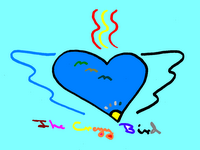 Yesterday's tale about "Broken Wing" needs some explanation, but it was so long for a blog post I felt should wait.
Yesterday's tale about "Broken Wing" needs some explanation, but it was so long for a blog post I felt should wait.Years ago, almost on a whim, I enrolled at the University of Copenhagen to study Semitic Philology. What prompted me was a song-poem by Leonard Cohen, "The Story of Isaac" which is a re-telling Abraham's near murder of his son told from the viewpoint of the intended victim.
In Cohen's song-poem there are plays upon the meaning of words in the original texts which form the basis of our so-called "Old Testament". The courses I took at the university gave me an opportunity to learn something of classical Hebrew without any serious theological bullshit.
Most of the names of people and places in these texts are descriptive and can be translated. For example, "Adam", as you probably know, means "Red Dirt" or "Red Clay". Less well known is that "Cain" means something like "Spearhead" and his brother, "Abel" is "Breeze".
It struck me that when we speak of Native Americans, the custom is not to present their names as they are spoken, but translated into English. I got this mad idea of what would the stories of the Bible look like if we treated the names of the people in this way.
That is how the story of "Broken Wing" and "Laughing Boy" came about. To make the transition complete, I moved the scene to a place in the early history of the Third Galaxy known as "Holy California" and tried to tell the tale from the viewpoint of the father who was possessed with this mad idea that "God" wanted him to sacrifice his son.
In the place in our Bible where Abraham is tempted to kill his son, the word "God" is a rendering of "Elohiim". The fact is, "Elohiim" is a plural form. The point is not that "God" is a plurality, but that our human understanding of "God" is what defines our humanity.
In the time and culture of Abraham the sacrifice of a first born child was not unknown. It wasn't common and not something common folk would do. But Abraham was a "king" and was committing himself to a Great God.
In my thinking I utterly deny the idea that "God" is "Other" -- therefore I cannot accept that some Being was actually telling old Abe to kill his son. Instead, I say that a terrible thought about the Reality of his God tempted the old man. The resolution of the story determines his humanity and that his "god" was not a demon.
It should be obvious, I think, that the lines of thought I propose must radicalize any ideas one might hold that God commanded the sacrifice of his son!
You can read something about the generally accepted views a literature referring to this story at Wikepedia.
_____________
And here is the text of L. Cohen's poem which has affected me so profoundly:
The door it opened slowly,
My father he came in, I was nine years old.
And he stood so tall above me,
His blue eyes they were shining
And his voice was very cold.
He said, I've had a vision
And you know I'm strong and holy,
I must do what I've been told.
So he started up the mountain,
I was running, he was walking,
And his axe was made of gold.
Well, the trees they got much smaller,
The lake a lady's mirror,
We stopped to drink some wine.
Then he threw the bottle over.
Broke a minute later
And he put his hand on mine.
Thought I saw an eagle
But it might have been a vulture,
I never could decide.
Then my father built an altar,
He looked once behind his shoulder,
He knew I would not hide.
You who build these altars now
To sacrifice these children,
You must not do it anymore.
A scheme is not a vision
And you never have been tempted
By a demon or a god.
You who stand above them now,
Your hatchets blunt and bloody,
You were not there before,
When I lay upon a mountain
And my fathers hand was trembling
With the beauty of the word.
And if you call me brother now,
Forgive me if I inquire,
Just according to whose plan?
When it all comes down to dust
I will kill you if I must,
I will help you if I can.
When it all comes down to dust
I will help you if I must,
I will kill you if I can.
And mercy on our uniform,
Man of peace or man of war,
The peacock spreads his fan.




No comments:
Post a Comment